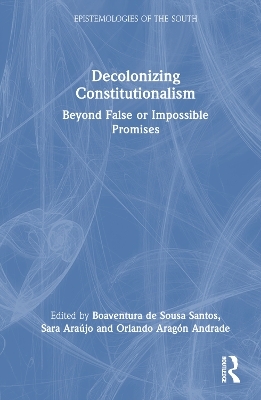
Decolonizing Constitutionalism
Routledge (Verlag)
978-1-032-49031-1 (ISBN)
The modern state, law, and constitution result from a legal canon that (re)produces the abyssal lines dividing the world that is validated from the world whose humanity and epistemological validity are denied. This book aims to contribute to a post-abyssal reflection on law and constitutionalism by considering the structural axes of power that are constitutive of modern law “capitalism, colonialism, and heteropatriarchy” alongside the legal plurality of the world. Is it possible to decolonize, decommodify, and depatriarchalize the constitution? The authors speak from multiple geographies, raise different questions, resort to differentiated theoretical approaches, and reveal varying levels of optimism about the possibilities of transforming constitutions. The readers are confronted with critical perspectives on the Eurocentric legal canon, as well as with the recognition of anti-capitalist, anti-colonial, and anti-patriarchal legal experiences. The horizon of this publication is the expansion of the possibilities of legal and political imagination.
Boaventura de Sousa Santos is Emeritus Professor of Sociology at the University of Coimbra (Portugal) and Distinguished Legal Scholar at the University of Wisconsin-Madison. He is also Director Emeritus of the Center for Social Studies at the University of Coimbra. He has written and published widely on the issues of sociology of law and the state, epistemology, intercultural democracy, social movements, postcolonialisms and global citizenship. Sara Araújo is a researcher at the Centre for Social Studies (CES) and invited assistant professor in sociology at the Faculty of Economics, University of Coimbra. She holds a PhD in Law, Justice and Citizenship in the 21st century and co-founded the PhD Programme in Sociology of the State, Law and Justice (CES and FEUC) that she now co-coordinates. She has researched and published on legal pluralism in Mozambique and East Timor, legal decolonization and social justice and cognitive justice in Europe. Orlando Aragón Andrade is a professor and researcher at the National Autonomous University of Mexico (in Morelia) where he is the coordinator of the Laboratory of Legal Anthropology and of the State. His research focuses on the study of indigenous peoples' collective rights, legal pluralism, counter hegemonic uses of law, law's decolonization, epistemologies of the South and, relevantly, the construction of a militant legal anthropology. He is also a legal advisor and accompanies several autonomy and self-government processes in Mexico, as part of the Emancipations Collective, of which he is a founding member.
Table of Contents: Boaventura de Sousa Santos; Sara Araújo; Orlando Aragón Andrade Preface Boaventura de Sousa Santos; Sara Araújo; Orlando Aragón Andrade Introduction Part 1. The vast landscape of constitutionalisms 1. Issa G. Shivji Do Constitutions Matter? The dilemma of a radical lawyer 2. Asifa Quraishi-Landes Healing a wounded Islamic constitutionalism: Sharia, legal pluralism, and unlearning the nation-State paradigm 3. Upendra Baxi Nihilisms, contradictions and anomie in new constitutionalisms: a view from India 4. Rosalva Aída Hernandez Towards a New Transformative Constitutionalism Arising from Indigenous Women? 5. Sara Araújo Modern Constitutionalism, Legal Pluralism and the Waste of Experience Part 2. Post-colonial Transitions: the case of South Africa 6. Heinz Klug Legacies and Latitudes: Past, present and future in South Africa’s post-colonial legal order 7. Albie Sachs Superior courts and the need of transformative jurisprudence. Shared experiences from a South African judge 8. Tshepo Madlingozi On Settler Colonialism and Post-Conquest Constitutionness: The Decolonising Constitutional Vision of African Nationalists of Azania/South Africa Part 3. The return of the abyssally excluded?: The indigenous constitutional struggles in Latin America 9. Salvador Schavelzon Can silence be a constituent? A reading on the indigenous-communitarian constitutionalism of Bolivia 10. Raúl Llasag Fernández Plurinational Constitutionalism: Plurinationality from Above and Plurinationality from Below 11. Nina Pacari Transformational constitutionalism, interculturality and the reform of the state: looking through the eyes of the originary peoples 12. Agustin Grijalva Participation and Presidentialism in the Ecuadorian Constitution of 2008 13. Orlando Aragón Andrade Transforming Transformative Constitutionalism. Lessons from the Political-Legal Experience of Cherán, Mexico 14. Boaventura de Sousa Santos The Law of the Excluded: Indigenous Justice, Plurinationality, and Interculturality in Bolivia and Ecuador Boaventura de Sousa Santos; Sara Araújo, Orlando Aragón Andrade Conclusion
| Erscheinungsdatum | 02.08.2023 |
|---|---|
| Reihe/Serie | Epistemologies of the South |
| Verlagsort | London |
| Sprache | englisch |
| Maße | 156 x 234 mm |
| Gewicht | 453 g |
| Themenwelt | Recht / Steuern ► EU / Internationales Recht |
| Recht / Steuern ► Öffentliches Recht | |
| Sozialwissenschaften ► Ethnologie | |
| Sozialwissenschaften ► Politik / Verwaltung ► Staat / Verwaltung | |
| Sozialwissenschaften ► Soziologie ► Makrosoziologie | |
| ISBN-10 | 1-032-49031-4 / 1032490314 |
| ISBN-13 | 978-1-032-49031-1 / 9781032490311 |
| Zustand | Neuware |
| Haben Sie eine Frage zum Produkt? |
aus dem Bereich


